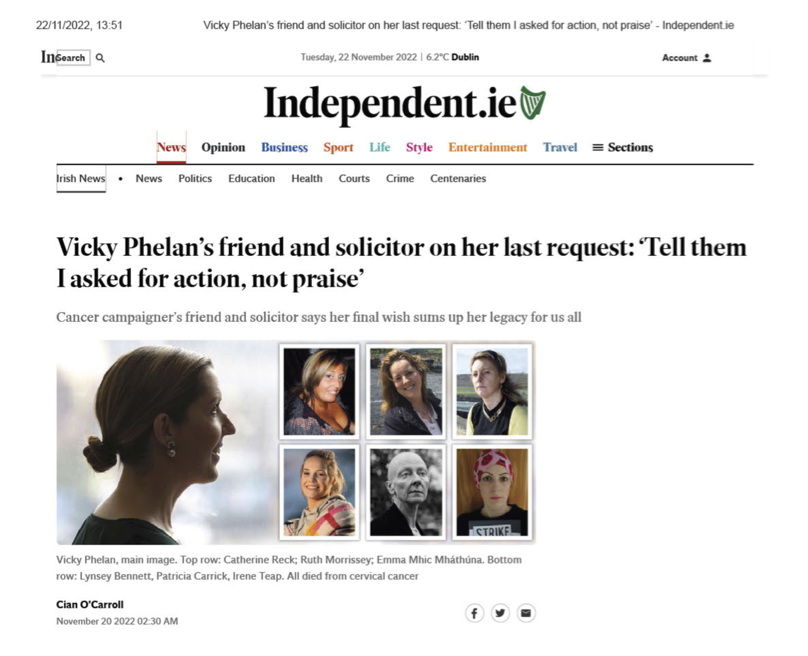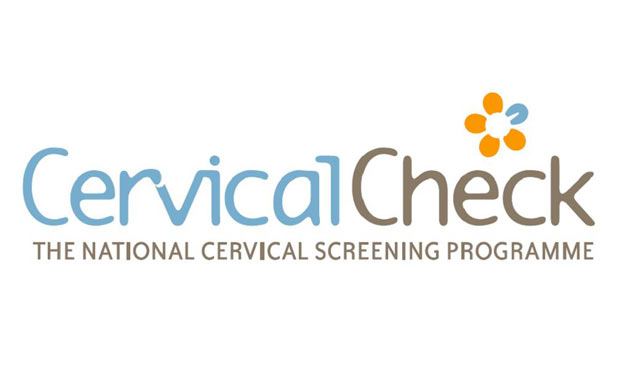Cian O’Carroll was this week’s guest on leading legal podcast The Fifth Court with Mark Tottenham and Peter Leonard. The interview addressed Cian’s introduction to law and how his interest in medical negligence law was stirred before going on to discuss his famous client Vicky Phelan and the wider CervicalCheck scandal, how wrong it was for the HSE and their laboratories to single out Ruth Morrissey for a test case at a time when she was dying and how well the courts work in such situations where a person has a limited life expectancy.
Cian also goes on to explain why the recent decision of Mr Justice Twomey was incorrect when it criticised the practice and particularly the practice of Cian O’Carroll Solicitors where they commission independent expert medical opinion to document the injuries of a client. The interview was recorded (unfortunately) before the recent judgment of Mr Justice Ferriter in Mclaughlin v. Dealey where he considered the practice and said that “a solicitor cannot be faulted for engaging a medical expert witness directly in an appropriate case”.
Cian also goes on to explain why the recent decision of Mr Justice Twomey was incorrect when it criticised the practice and particularly the practice of Cian O’Carroll Solicitors where they commission independent expert medical opinion to document the injuries of a client. The interview was recorded (unfortunately) before the recent judgment of Mr Justice Ferriter in Mclaughlin v. Dealey where he considered the practice and said that “a solicitor cannot be faulted for engaging a medical expert witness directly in an appropriate case”.
The late healthcare campaigner, Vicky Phelan was “an extraordinary person” because of her work in seeking justice for all women affected by the CervicalCheck scandal, according to her medical negligence solicitor, Cian O’Carroll. The Tipperary-based lawyer described Ms Phelan, who died last November following a long battle with cancer, as the “most altruistic person” he had ever met and found working her to be “empowering” and motivational.
“She was truly willing to sacrifice an awful lot of herself, her time – which was incredibly precious – and her privacy,” said Mr O’Carroll.
In an interview on the legal podcast, The Fifth Court, Mr O’Carroll paid tribute to his client’s determination not to sign a confidentiality clause to reach an early settlement to her case in order to highlight to other women that there had cancer misdiagnoses with smear tests under the CervicalCheck screening programme run by the HSE. The solicitor revealed that Ms Phelan had stressed on the first occasion that they met that she would never sign a non-disclosure clause which he described as “very rare".
“She was truly willing to sacrifice an awful lot of herself, her time – which was incredibly precious – and her privacy,” said Mr O’Carroll.
In an interview on the legal podcast, The Fifth Court, Mr O’Carroll paid tribute to his client’s determination not to sign a confidentiality clause to reach an early settlement to her case in order to highlight to other women that there had cancer misdiagnoses with smear tests under the CervicalCheck screening programme run by the HSE. The solicitor revealed that Ms Phelan had stressed on the first occasion that they met that she would never sign a non-disclosure clause which he described as “very rare".
Ms Phelan reached a €2.5m settlement without an admission of liability with US firm, Clinical Pathology Laboratories in the High Court in April 2018. The mother-of-two had a smear test in 2011 which showed no abnormalities but an audit in 2014 found the results were incorrect. Ms Phelan was diagnosed with cervical cancer in 2014 but was not informed of the audit’s findings until 2017. She believed she would have had a strong chance of survival if the cancer had been detected by the test in 2011. Mr O’Carroll told the podcast’s presenters – barristers, Mark Tottenham and Peter Leonard – that he did not think a non-disclosure clause would be a feature of the case, but Ms Phelan had correctly anticipated it. He said lawyers for the US laboratory had made it an absolute pre-condition to any agreement that its terms would be confidential. The solicitor pointed out that he was on record, with Ms Phelan’s consent, of stating that he had advised his client that it was not in her best interest to oppose such a clause given she was very sick and it would be prudent to at least explore what financial settlement was being offered. However, he said Ms Phelan was very clear about what she wanted and on that basis he was happy to help her “blow the lid off this thing.”
“It was a pretty shabby thing that was going on,” he remarked.
The solicitor said he believed that Ms Phelan’s campaigning had helped to improve the quality of screening programmes like CervicalCheck. However, he said the current Patient Safety Bill, which requires the mandatory open disclosure of serious patient safety incidents, highlighted how difficult it was “to find the truth from the medical profession in Ireland.” Mr O’Carroll said doctors had successfully lobbied to ensure there was a clause in the legislation, which has been described as Ms Phelan’s legacy, that would not allow the results of a restarted audit to be disclosed to a patient. He said Ms Phelan, a university educational manager from Annacotty, Co Limerick was a very private person who was not seeking attention or publicity. However, he said she would admit herself that she derived tremendous strength and support from the outpouring of love and good wishes that she received from people in Ireland and internationally. Mr O’Carroll said they developed a very close friendship from when they first met in January 2018.
“She was just a wonderful person,” the solicitor recalled
He noted that many people who face an uncertain future tend to be very altruistic, empathetic and “focused on the right things for all the right reasons” which made it easy to form good working relationships. Mr O’Carroll said he and his colleague, Siobhan Ryan, had hugged Ms Phelan at the end of their first meeting which was unusual with clients. The lawyer said that he knew straight away that they would need to act urgently to get Ms Phelan’s case listed in the High Court as she already knew she was suffering a terminal illness. At the time, Mr O’Carroll said Ms Phelan had told him that she had only six months to live.
While she was always purposeful, he added: “There were other times when she would let her hair down and have fun.
Mr O’Carroll said she had also been involved in many successful campaigns. “There were some parts of her life’s work that were unfinished at the time she died and hopefully those will progress,” he remarked. The solicitor also praised the High Court judge, Mr Justice Kevin Cross, for prioritising urgent court proceedings like Ms Phelan’s and the Irish legal system. However, he sharply criticised the medical profession and HSE for taking a Supreme Court challenge against a High Court ruling in a similar case to Ms Phelan, when Ruth Morrissey successfully sued the HSE and two laboratories. Mr O’Carroll said the HSE had stayed silent during the High Court proceedings when it was generally accepted by all other parties that the standard for analysing smear tests was one of “absolute confidence” before giving the all-clear in reading slides. He claimed there was “an extraordinary reaction” to the High Court judgement from senior clinicians which resulted in the HSE appealing the High Court judgement on an issue about which it had declined to make a submission during the original proceedings.
“I thought that was outrageous. To do that to a dying woman in the final months of her life was an extraordinarily unfair and unkind thing to do,” he remarked.
The medical negligence solicitor said doctors had disingenuously claimed it was an impossible standard, even though the courts had practically interpreted the test as effectively “an absence of doubt.”
Mr O’Carroll said there were ongoing legal cases for women affected by the CervicalCheck scandal which would probably still take a number of years to conclude.
Mr O’Carroll said there were ongoing legal cases for women affected by the CervicalCheck scandal which would probably still take a number of years to conclude.








 RSS Feed
RSS Feed



